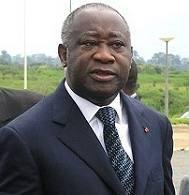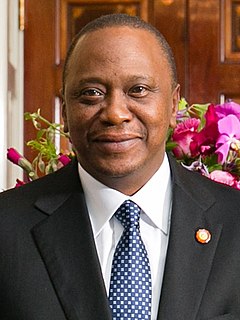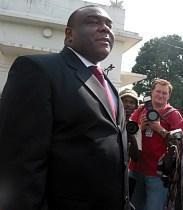The history of the Central African Republic is roughly composed of four distinct periods. The earliest period of settlement began around 10,000 years ago when nomadic people first began to settle, farm and fish in the region. The next period began around 1,000 to 3,000 years ago when several non-indigenous groups began to migrate into the region from other parts of the continent. The third period involved the colonial conquest and rule of the country by France and Germany which spanned from the late 1800s until 1960 when the Central African Republic became an independent state. The final period has been the era during which the Central African Republic has been an independent state.

The International Criminal Court is an intergovernmental organization and international tribunal that sits in The Hague, Netherlands. The ICC is the first and only permanent international court with jurisdiction to prosecute individuals for the international crimes of genocide, crimes against humanity, war crimes and the crime of aggression. It is intended to complement existing national judicial systems, and it may, therefore, exercise its jurisdiction only when national courts are unwilling or unable to prosecute criminals. The ICC lacks universal territorial jurisdiction and may only investigate and prosecute crimes committed within member states, crimes committed by nationals of member states, or crimes in situations referred to the Court by the United Nations Security Council.

Koudou Laurent Gbagbo is an Ivorian politician who was the President of Côte d'Ivoire from 2000 until his arrest in April 2011. A historian, Gbagbo was imprisoned in the early 1970s and again in the early 1990s, and he lived in exile in France during much of the 1980s as a result of his union activism. Gbagbo founded the Ivorian Popular Front (FPI) in 1982 and ran unsuccessfully for president against Félix Houphouët-Boigny at the start of multi-party politics in 1990. He won a seat in the National Assembly of Côte d'Ivoire in 1990.

Field Marshal Omar Hassan Ahmad al-Bashir is a Sudanese former military officer, politician, and war criminal who served as the seventh head of state of Sudan under various titles from 1989 to 2019, when he was deposed in a coup d'état. He was subsequently incarcerated, tried and convicted on multiple corruption charges. He came to power in 1989 when, as a brigadier general in the Sudanese Army, he led a group of officers in a military coup that ousted the democratically elected government of prime minister Sadiq al-Mahdi after it began negotiations with rebels in the south. He was elected three times as President in elections that have been under scrutiny for electoral fraud. In 1992, al-Bashir founded the National Congress Party, which remained the dominant political party in the country until 2019. In March 2009, al-Bashir became the first sitting head of state to be indicted by the International Criminal Court (ICC), for allegedly directing a campaign of mass killing, rape, and pillage against civilians in Darfur. On 11 February 2020, the Sudanese government announced that it had agreed to hand over al-Bashir to the ICC for trial.

Uhuru Muigai Kenyatta is a Kenyan politician who has served as the President of Kenya since 2013. He served as the member of parliament (MP) for Gatundu South from 2002 to 2013. He also served as Deputy Prime Minister from 2007 to 2013. Currently, he is a member and the party leader of the Jubilee Party of Kenya. Uhuru was previously associated with the Kenya Africa National Union (KANU) before founding The National Alliance (TNA), one of the allied parties that campaigned for his re-election during the 2017 general elections and later on went to form a merger with the William Samoei Ruto's United Republican Party (URP) to form the Jubilee Party. Uhuru's tenure has been marred by endless cases of corruption and impunity.
Saif al-Islam Muammar Gaddafi is a Libyan political figure. He is the second son of the late Libyan leader Muammar Gaddafi and his second wife Safia Farkash. He was a part of his father's inner circle, performing public relations and diplomatic roles on his behalf. He publicly turned down his father's offer of the country's second highest post and held no official government position. According to American State Department officials in Tripoli, during his father's reign, he was the second most widely recognized person in Libya, being at times the "de facto" Prime Minister, and was mentioned as a possible successor, though he rejected this. An arrest warrant was issued for him on 27 June 2011 by the International Criminal Court (ICC) for charges of crimes against humanity against the Libyan people, for killing and persecuting civilians, under Articles 7(1)(a) and 7(1)(h) of the Rome statute. He denied the charges.
The Movement for the Liberation of the Congo is a political party in Democratic Republic of the Congo. Formerly a rebel group operating in the Democratic Republic of Congo that fought the government throughout the Second Congo War, it subsequently took part in the transitional government and is one of the main opposition parties.
Abdel Rahim Mohammed Hussein is a Sudanese politician and the former Governor of Khartoum State. Hussein served as the longstanding Minister of National Defense of The Republic of Sudan. Hussein also served for a period as the Minister of Interior Affairs. During his term as Minister of Interior Affairs, he opened the Rabat University.Hussein was arrested in early April 2019 following a coup on 11 April which overthrew al-Bashir.

Jean-Pierre Bemba Gombo is a politician in the Democratic Republic of the Congo. He was one of four vice-presidents in the transitional government of the Democratic Republic of the Congo from 17 July 2003 to December 2006. Bemba also leads the Movement for the Liberation of the Congo (MLC), a rebel group turned political party. He received the second-highest number of votes in the 2006 presidential election. In January 2007 he was elected to the Senate.
Thomas Lubanga Dyilo is a convicted war criminal from the Democratic Republic of the Congo (DRC) and the first person ever convicted by the International Criminal Court (ICC). He founded and led the Union of Congolese Patriots (UPC) and was a key player in the Ituri conflict (1999–2007). Rebels under his command have been accused of massive human rights violations, including ethnic massacres, murder, torture, rape, mutilation, and forcibly conscripting child soldiers.

So far, the International Criminal Court opened investigations in the Central African Republic, Côte d'Ivoire, Darfur, Sudan, the Democratic Republic of the Congo, Kenya; Libya, Uganda, Bangladesh/Myanmar and Palestine. Additionally, the Office of the Prosecutor conducted preliminary examinations in ten situations in Afghanistan, Colombia, Guinea, Iraq / the United Kingdom, Nigeria, Georgia, Honduras, South Korea and Venezuela. Preliminary investigations were closed in Gabon, Honduras, registered vessels of Comoros, Greece, and Cambodia, South Korea, and Venezuela on events since 1 July 2002.

Ali Muhammad Ali Abd-Al-Rahman, commonly known as Ali Kushayb, is a senior Janjaweed commander who supported the Sudanese government against Darfur rebel groups during the Omar al-Bashir presidency. He was indicted by the International Criminal Court (ICC) for war crimes. He was known as aqid al oqada and was active in Wadi Salih, West Darfur. On 27 February 2007, Prosecutor Luis Moreno-Ocampo charged Kushayb with crimes against civilians in Darfur during 2003 and 2004, accusing him of ordering killings, rapes, and looting. An ICC arrest warrant was issued for him and Ahmed Haroun, his co-defendant, on 27 April 2007. In April 2008, he was released from Sudanese custody. Sudanese authorities re-arrested Kushayb in October 2008. In early 2013, Kushayb was commander of the Central Reserve Forces in Rahad el-Berdi in South Darfur. Reports on his activities continued sporadically from 2013 to 2017

Germain Katanga, also known as Simba, is a former leader of the Patriotic Resistance Force in Ituri (FRPI), an armed group in the Ituri Province of the Democratic Republic of the Congo (DRC). On 17 October 2007, the Congolese authorities surrendered him to the International Criminal Court (ICC) to stand trial on six counts of war crimes and three counts of crimes against humanity. The charges include murder, sexual slavery, rape, destruction of property, pillaging, willful killing, and directing crimes against civilians, to name a few.
Bosco Ntaganda is a convicted war criminal and the former military chief of staff of the National Congress for the Defense of the People (CNDP), an armed militia group operating in the North Kivu province of the Democratic Republic of the Congo (DRC). He is a former member of the Rwandan Patriotic Army and allegedly a former Deputy Chief of the General Staff of the Patriotic Forces for the Liberation of Congo (FPLC), the military wing of the Union of Congolese Patriots.

Luis Moreno Ocampo is an Argentine lawyer and the former first Prosecutor of the International Criminal Court (ICC) (2003–2012). Previously, he played a major role in Argentina's democratic transition (1983–1991).

The International Criminal Court investigation in the Democratic Republic of the Congo or the situation in the Democratic Republic of the Congo is an ongoing investigation by the International Criminal Court (ICC) into crimes committed in the Democratic Republic of the Congo (DRC) during the Second Congo War and its aftermath, including the Ituri and Kivu conflicts. The war started in 1998 and despite a peace agreement between combatants in 2003, conflict continued in the eastern parts of the country for several years. In April 2004 the government of the DRC formally referred the situation in the Congo to the International Criminal Court, and in June 2004, prosecutor Luis Moreno Ocampo, formally opened an investigation. To date, arrest warrants have been issued for:

The Central African Republic Civil War is an ongoing civil war in the Central African Republic (CAR) involving the government, rebels from the Séléka coalition, and anti-balaka militias.

The Anti-balaka is an alliance of militia groups based in the Central African Republic in the early 21st century said to be composed primarily of Christians. However, some church leaders have contested the claimed exclusively Christian character of such groups. The Tony Blair Faith Foundation and journalist Andrew Katz have noted that animists also participate in Anti-balaka groups.

Thierry François Pelenga alias Bokassa is an Anti-balaka leader from Haute-Kotto prefecture in the Central African Republic and a war criminal.













